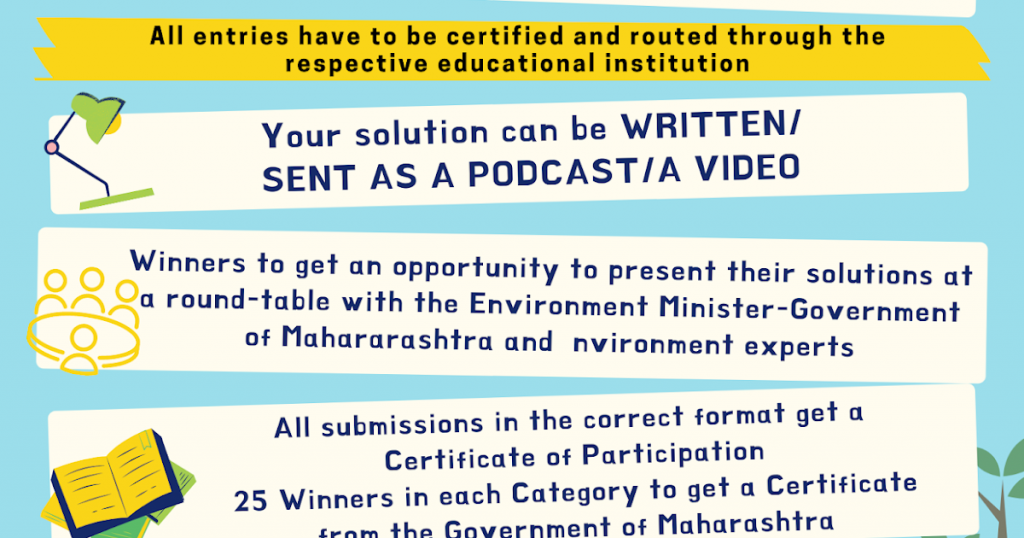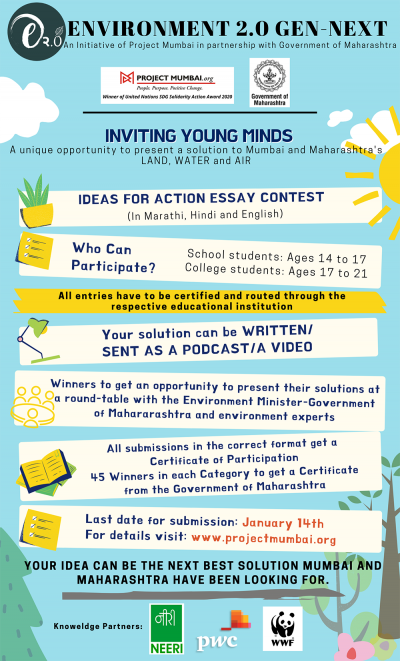Environment 2.0 Gen Next
“Never doubt that a small group of thoughtful committed citizens can change the world indeed it is the only thing that ever has”
Project Mumbai in partnership with the government of Maharashtra, Department of Environment and climate change, brought together a gathering of influencers across the spectrum who spent quality time to present a result oriented, time bound environment action plan for Mumbai, the Mumbai Metropolitan Region (MMR) and Maharashtra.
National Environmental Engineering Research Institute (NEERI) and PwC were the knowledge partners for this historic decisive gathering.
The uniqueness of this gathering was that in Mumbai and Maharashtra’s Gen next, students between 14 to 21 were invited to help shape this policy which would help to understand how we should be dealing with our environment – land, water an air.
This was done through a hugely interactive ‘Ideas for action’ essay contest across languages and was judged by an eminent set of credible names.
As a concurrent to the ‘Ideas for action’ essays, a series of mini summits was jointly hosted by Project Mumbai and the Minister of Environment and Climate Change on some key issues, subjects and themes that require deep thinking. The takeaways derived from them from these mini summits were a part of environment 2.0.
Environment 2.0 Gen next – Ideas for Action contest
Environment 2.0 was derived from the broader Mumbai 2.0 conference of influencers hosted by Project Mumbai in December 2018, wherein one of the emergent discussion outcomes raised was Mumbai and Maharashtra’s environment.
The Maharashtra government holds the unique distinction across India of choosing environment as one of its primary agendas. This decision has always been appreciated across age groups and more specifically, the youth. It thus becomes imperative to channel the enthusiasm and creativity of young Mumbaikars to shape the developmental agenda for MMR as well as Maharashtra.
Contest for youngsters – Youth constitute a large part of Mumbai and Maharashtra’s population and will have to manage the consequences of current environmental decisions. We believe it is time to empower the youth through active engagement on key environmental issues. Ideas for action was a platform for them to come up with solutions around these three major environmental challenges that the country’s most active coastal megapolis Mumbai faces.
Impact of the initiative
- Environment 2.0 was an initiative carried out by Project Mumbai in partnership with PWC, Neeri and goverment of Maharashtra.
- Make the world a better place
- Share your love for community
Gallery


The initiative focused on four main themes :-
1 . Climate change
‘Climate change is the defining issue of our time and we are at a defining moment – United Nations secretary general.’
Climate change is accelerating and impacts are happening now. The impacts of climate change are global in scope, irreversible in nature and unprecedented in scale. Over the past years, it has become one of the greatest threats to the existence of human race.
Its impact can be felt in the form of increasing global temperatures, shifting weather patterns, extreme weather events, such as unprecedented levels of rainfall and floods, storms, unusual spells of hot weather, increase in droughts etc. Beyond these immediate and visible impacts of climate change, there is alarming evidence that point towards deterioration of natural ecosystems and the planetary boundaries that may already have been reached or passed.
For a developing nation like India, climate change poses even greater challenges. An increase in temperature can lead to an increase in temperature related illnesses, vector borne diseases, cholera and health effects due to food insecurity. The phase of rapid and uncertain natural disasters can already be observed with a visible increase in the frequency of hot days, heat waves, droughts, rise in the frequency of heavy rainfall events, flash floods and a rise in sea levels.
The next generation of citizens that is the youth of our country are going to be the ones to face the hard consequences of climate change. They are also the ones best positioned to break existing social practices and stigma’s to bring about meaningful change in the society.
2 . Clean air
- The World Health Organisation (WHO) defines air pollution as the presence of materials in the air in such concentration which is harmful to man and his environment. India is home to 22 of the world’s 30 most polluted cities. Breathing in polluted air can be very bad for health. Long term exposure to air pollution has been associated with diseases of the heart and lungs, cancer and other health problems. Suggested topics
Transportation –
- Vehicular emissions
- Suspended dust
Green cover
- National Park
- Vertical gardens
- Waterfront development
Oher (for eg. Construction) –
- Industries and power plants
- Biofuel emissions
- Waste burning
3 . Clean Water
- – Cities around the world are facing acute shortages of drinking water resources with the population in cities expected to grow exponentially to 68% by 2050.
The challenge to provide clean water to those living in urban areas is only going to get harder. Every year the stock in Mumbai during the summer falls drastically and it had reached as low as 5.37% before the arrival of monsoon this year.
This calls for a behavioral change from water intensive lifestyles, conservation initiatives/programs at the household and municipal level, and innovative solutions to reduce water use.
Suggested topics :-
Waste water
- Rainwater harvesting ; Reducing water leakages
- Sewage treatment ; waste water recycling and reuse
- Effective ways to deal with water contamination during monsoon
Rivers and lakes
– River cleaning
– Lake rejuvenation, desilting and maintenance of natural reservoirs
Sea and beaches
- Marine litter
- Beach cleaning
4 . Clean Land
Indian cities generate about 1.5 Lac tonnes of garbage everyday, of which only ¼ gets processed. More than 10 Lac plastic drinking bottles are purchased every minute around the world, most of which are non recyclable. Waste generation in Mumbai has more than doubled in the last 15 years, touching 11,000 tonnes per day in the year 2016.
Untreated waste contaminates our land, waterbodies and poses a serious health threat to the city’s growing population.
Suggested topics :-
Segregation/collection
- Segregation at source
- Plastic ban
Processing/landfill
– Landfill sites
– Waste to energy
Circular economy

